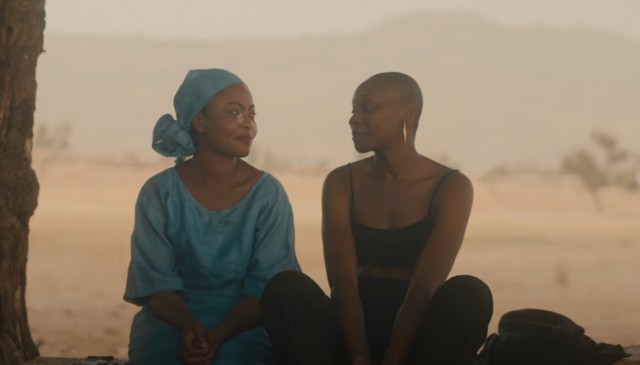As Salewa goes home to Nigeria for the funeral of her mother – a pillar of a very religious community that she feels disconnected from – upon her return she encounters a person from her past. With Egúngún (Masquerade), writer/director Olive Nwosu explores the power of the past on our present, and how healing can stop us from running away from old wounds. With its gorgeous cinematography and sensitive screenplay, Nwosu transports us to Nigeria, where we join her main character on a physical and emotional journey.
“I have lived in many identities”
Revealing that it was her own personal feelings on the concept of “home” that initially inspired her screenplay, Nwosu felt like she had “lived in many identities” after being away from home for a long time. Using her short film to portray her own reflections on “the possibility of different lived lives”, Egúngún also touches on the role of fate, in deciding which version of us will exist. By returning home, Salewa ultimately confronts who she is, with who she was (and who she could have been), leading her to discover a sense of peace.
“I wanted to use the symbol of the Egúngún, the masquerade – so present in Nigerian and African cosmology – to investigate the idea of selfhood, all the different layers of ourselves we hide”, the director explains. Immersing us in that culture also fleshes out her main character, as a woman who left Nigeria and now lives in London. In every single frame, Salewa stands out in a way, not entirely out of place, but rather someone familiar with the environment, if not completely comfortable in it.

Sheila Chukwulozie (R) stars alongside Teniola Alade in Olive Nwosu’s short film Egúngún (Masquerade)
The importance of this alienation and the presence of spirituality in the narrative are brought to the screen with the striking cinematography, frame composition and camera movements. Nwosu and her DP Tom L. Weir working to make the camera almost like a character in their film. Echoing the weight of her ancestors that Salewa feels when she gets to Lagos and creates a sense that her decision making is being shaped by this influence.
In the lead role, Sheila Chukwulozie’s portrayal of Salewa is not only subtle and nuanced but also deeply moving, as we see her confront these different versions of herself, while also carrying the weight of her ancestors on her shoulders. Through close-ups, and with very little dialogue, she communicates the inner turmoil of her character, highlighting the sensitivity of Nwosu’s screenplay. Her presence on screen is magnetic, making the audience instantly want to follow her on her quest, as she comes to terms with her past. In the second half of the film, her chemistry with Teniola Alade is intense and through glimpses of their childhood we get to understand their history, adding a level of innocence to their relationship and how she remembers it.
Egúngún had its World Premiere at the 2021 edition of Toronto’s TIFF, before a notable festival run included selections at Sundance and Palm Springs, awards at Hamptons and Aspen, and culminated in a BIFA nomination. Nwosu is currently developing three features, Lady with Film4 and BFI, Purple Hibiscus with Searchlight and House productions, and A Burial with BBC.

 Céline Roustan
Céline Roustan